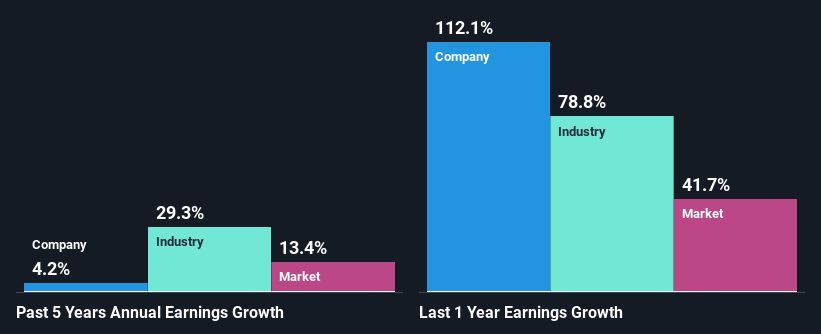Duluth Holdings Inc.'s (NASDAQ:DLTH) Fundamentals Look Pretty Strong: Could The Market Be Wrong About The Stock?
Duluth Holdings (NASDAQ:DLTH) has had a rough week with its share price down 3.2%. But if you pay close attention, you might find that its key financial indicators look quite decent, which could mean that the stock could potentially rise in the long-term given how markets usually reward more resilient long-term fundamentals. In this article, we decided to focus on Duluth Holdings' ROE.
Return on equity or ROE is an important factor to be considered by a shareholder because it tells them how effectively their capital is being reinvested. In other words, it is a profitability ratio which measures the rate of return on the capital provided by the company's shareholders.
Check out our latest analysis for Duluth Holdings
How Is ROE Calculated?
The formula for ROE is:
Return on Equity = Net Profit (from continuing operations) ÷ Shareholders' Equity
So, based on the above formula, the ROE for Duluth Holdings is:
17% = US$34m ÷ US$205m (Based on the trailing twelve months to October 2021).
The 'return' is the yearly profit. One way to conceptualize this is that for each $1 of shareholders' capital it has, the company made $0.17 in profit.
What Has ROE Got To Do With Earnings Growth?
So far, we've learned that ROE is a measure of a company's profitability. Based on how much of its profits the company chooses to reinvest or "retain", we are then able to evaluate a company's future ability to generate profits. Assuming everything else remains unchanged, the higher the ROE and profit retention, the higher the growth rate of a company compared to companies that don't necessarily bear these characteristics.
Duluth Holdings' Earnings Growth And 17% ROE
To start with, Duluth Holdings' ROE looks acceptable. Even so, when compared with the average industry ROE of 21%, we aren't very excited. Further, Duluth Holdings' five year net income growth of 4.2% is on the lower side. Bear in mind, the company does have a respectable level of ROE. It is just that the industry ROE is higher. Hence there might be some other aspects that are keeping growth in earnings low. Such as, the company pays out a huge portion of its earnings as dividends, or is facing competitive pressures.
Next, on comparing with the industry net income growth, we found that Duluth Holdings' reported growth was lower than the industry growth of 29% in the same period, which is not something we like to see.
Earnings growth is a huge factor in stock valuation. What investors need to determine next is if the expected earnings growth, or the lack of it, is already built into the share price. This then helps them determine if the stock is placed for a bright or bleak future. If you're wondering about Duluth Holdings''s valuation, check out this gauge of its price-to-earnings ratio, as compared to its industry.
Is Duluth Holdings Using Its Retained Earnings Effectively?
Duluth Holdings doesn't pay any dividend currently which essentially means that it has been reinvesting all of its profits into the business. However, this doesn't explain the low earnings growth the company has seen. So there might be other factors at play here which could potentially be hampering growth. For example, the business has faced some headwinds.
Conclusion
On the whole, we do feel that Duluth Holdings has some positive attributes. However, while the company does have a decent ROE and a high profit retention, its earnings growth number is quite disappointing. This suggests that there might be some external threat to the business, that's hampering growth. Having said that, looking at the current analyst estimates, we found that the company's earnings are expected to gain momentum. To know more about the company's future earnings growth forecasts take a look at this free report on analyst forecasts for the company to find out more.
Have feedback on this article? Concerned about the content? Get in touch with us directly. Alternatively, email editorial-team (at) simplywallst.com.
This article by Simply Wall St is general in nature. We provide commentary based on historical data and analyst forecasts only using an unbiased methodology and our articles are not intended to be financial advice. It does not constitute a recommendation to buy or sell any stock, and does not take account of your objectives, or your financial situation. We aim to bring you long-term focused analysis driven by fundamental data. Note that our analysis may not factor in the latest price-sensitive company announcements or qualitative material. Simply Wall St has no position in any stocks mentioned.

 Yahoo Finance
Yahoo Finance 
